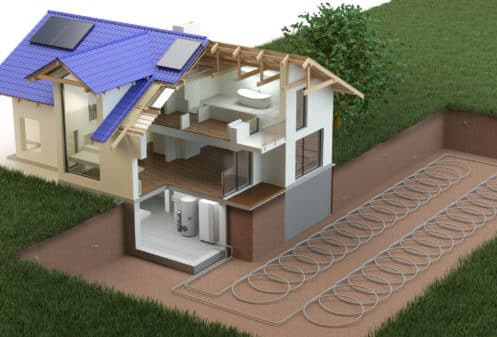Geothermal energy is a form of energy that can make it very simple for homeowners and business owners to obtain what they need without burning many fossil fuels. In this blog post, we will examine some of the most significant advantages and disadvantages of using geothermal energy for your home or business in terms of energy.
Advantages of Geothermal Energy
Geothermal Energy Is a Highly Reliable Source of Energy
One of the main benefits of geothermal energy is that it is a very predictable and dependable energy source, especially compared to other renewable energy sources like wind and solar energy.
Geothermal power plants usually have continuous power output regardless of the time of day or season. This is in contrast to wind and solar power plants, which are more intermittent sources that need energy storage to be employed at a large scale to be most effective. One of the many positive effects of this is the fact that geothermal power is a good source for meeting baseload energy demand.
Environmentally Friendly
All facets of geothermal energy production and use are environmentally friendly. It is renowned for having a minor influence on all the power sources. Geothermal energy practically has zero emissions during the development and production processes. When it comes to the creation of this kind of power, absolutely no carbon is used. Sulfur that may have typically been emitted from other processes can also be cleaned out during the entire process.
It Is Long-Lasting
The sustainability of geothermal energy is one of its main benefits. It will exist for the duration of the Earth. Geothermal energy is generated from the Earth’s core’s heat, which can naturally replenish itself. This is not true with fossil fuels. Since geothermal energy does not affect the planet’s temperature, experts agree that it will be safe to utilize as an energy source for as long as humans require it.
Excellent for Cooling and Heating
High water temperatures are necessary to turn the power-generating turbines using geothermal energy, preferably greater than 150 degrees Celcius. Using geothermal energy for heating and cooling is an alternative, more accessible method. This method uses the (relatively modest) temperature difference between a ground source and the surface.
The seasonal temperature fluctuations that affect air are typically less pronounced on Earth. As a result, a geothermal heat pump can use the heat in the Earth just a few feet below the surface, much like an electrical heat pump uses the heat in the air. In the last few years, geothermal heating and cooling have become increasingly popular among homeowners.
Requires No Big Spaces
Geothermal power facilities only require moderate amounts of space, unlike the majesty of enormous wind turbines and photovoltaic panels. Most parts are buried underground, with very little remaining above ground, whether in a small-scale system or a large-scale facility.
The heat pump is roughly the size of a household appliance in a home, whereas at larger plants, cooling towers and turbines are enormous building blocks. The plants may have an aesthetic impact on the landscape in some circumstances, but more recent architectural designs have lessened this problem.
No Fuel Needed
Geothermal power plants do not need fuel to produce energy, in contrast to conventional power plants. This eliminates the need for fuel transportation, storage, and accompanying expenses. This makes geothermal energy a desirable choice for people seeking to lower their energy expenditures.
Disadvantages of Geothermal Energy
The Potential of Geothermal Resource Depletion
Even though geothermal energy is regarded as a sustainable and renewable resource, some places could likely cool off, making it impossible to continue harvesting geothermal energy.
The only non-depletable approach is to obtain geothermal energy directly from magma, but this technology is currently being developed. Magma will exist for billions of years, making this choice financially worthwhile.
Initial Costs Can Be High
High upfront costs are another drawback of geothermal energy. There is some solace in this, though. Other than routine maintenance, there are no ongoing fees for the system’s fuel. The labor required to drill into the ground and install the system accounts for the high cost. Current prices for renewable energy sources, including solar and wind, place geothermal as the most expensive choice.
Geothermal Power May Cause Surface Instability
This is linked to modifications in the structure of the Earth brought on by digging. More difficulty is presented by advanced geothermal energy, which uses the resource by forcing water more profoundly into the Earth’s crust to cause new fissures. Most geothermal facilities are located far from populated areas, however.
Moreover, it can cause instability because geothermal power plants can cause earthquakes and surface instability. Drilling hot rock with water or steam trapped in its pores and natural fractures is necessary for the geothermal power plant’s conventional configuration. When a drilled hole crosses one of these fissures, the compressed water explodes as steam due to a heat reduction.
It Is Only Available in Some Places
Even though the Earth’s crust contains a lot of heat, it can be challenging to access. Most geothermal facilities are constructed along fault lines because magma is more accessible there. This explains why geothermal plants are more prevalent in areas with higher levels of volcanic activity.
Unfortunately, only so many places are ideal for geothermal plants. The cost of constructing a plant increases with each kilometer of underground drilling. Yet, smaller geothermal heat pumps can extract enough heat from the Earth’s crust’s uppermost layers to power homes and businesses.
It Can Lead to Air and Groundwater Pollution
Geothermal energy harvesting can potentially impair air and groundwater quality, although it is less environmentally harmful than oil drilling or coal mining. Carbon dioxide, a greenhouse gas, makes up the majority of emissions; however, this causes much less harm than fossil fuel plants that provide an equivalent amount of electricity. The additives employed to prevent the deposition of particles on expensive machinery and drill casings are mostly to blame for the effects on groundwater.
Furthermore, geothermal water frequently exceeds primary and secondary drinking water requirements for total dissolved solids, fluoride, chloride, and sulfate. This water can contaminate the air and groundwater when transformed into steam and then condensed and returned underground.
Contamination levels may increase further if a leak develops in an enhanced geothermal system (EGS). Finally, emissions from geothermal power facilities may include substances like arsenic, boron, and mercury.
As you can see, geothermal energy brings with it many pros and cons. As a homeowner or business owner, you will need to decide whether the benefits outweigh the consequences.
If you are an individual who cares about the environment, then you may opt for using geothermal energy since it is highly reliable, environmentally friendly, and long-lasting. However, you also need to keep in mind that upfront costs may be high to install a geothermal energy system on your property.
Comfort Zone Heating & Air Conditioning offers excellent heating and cooling services for residents of Cobourg, ON and the surrounding areas. We can also help you with your plumbing, ductless, and indoor air quality needs. Since 2005, we have been providing excellent services to clients in the neighborhood. Our team is dedicated to providing superior customer service on every job.
Being a locally owned and run company, we take great satisfaction in putting the needs of our clients first. We also take great pride in providing our customers with top-notch guarantees that they will always receive what they paid for and expected. Call us at Comfort Zone Heating & Air Conditioning today if you’d like to use our services or schedule an appointment. Our team will also be happy to answer any questions you may have about utilizing geothermal energy at your home or business.




